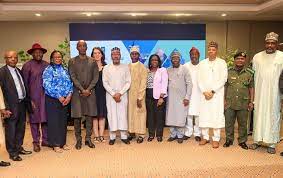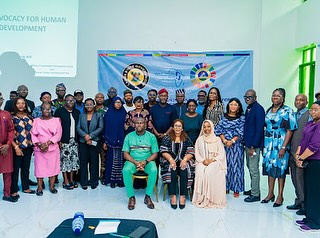The United Nations Development Programme (UNDP) says that global carbon trade has in a short space of time grown into a market worth over $175 billion annually.
The UNDP Representative, Mr Mohammed Yahaya, disclosed this at the inauguration of the Nigeria Emission Trading Scheme (ETS) on Tuesday in Abuja.
Yahaya also said, according to a data made available from World Atlas, that as at 2020, carbon dioxide emissions for Nigeria was about 126,9 million tonnes.
He said that the emission was coming mainly from burning of fossil fuel and heavy industries such as cement manufacturing.
“For country like Nigeria, carbon trading should be looked for both medium and long term objectives which at the end of the day, will provide a lot of environmental benefits to the country.
“In some countries, carbon emission trading has been known to be source of generating money for nature-based solutions to climate change.
“This belief can be said to be the same for Nigeria in the nearest future,” he said.
Yahaya said that history of carbon markets could be marked as a great political success story and an integral part of international climate change policies across the world.
He explained that carbon credits were provided for activities that claimed to benefit the climate, either by removing carbon dioxide from the air or preventing it from being emitted.
The UNDP representative said that carbon trading was the procurement of such credits.
According to him, this is what has given birth to ETS, which has, however, given flexibility to governments to deal with vested interests.
“It has also allowed governments and decision makers to focus on the acceptability of the initial allocation in both domestic and international contexts.
“Emissions trading systems expose emitters to the external costs of emissions in the most flexible and least costly way,” he said.
Yahaya said that the design of the system needed to consider local contexts and regulations, as well as interlinkages with other policy priorities in each jurisdiction.
He, therefore, said that emissions trading was likely to be part of a broader policy mix to control emissions from the whole economy.
He added that an emission trading scheme was potentially one of the most powerful tools to build an effective global response to climate change.
“It is also a tool that will meet the Nationally Determined Contributions (NDCs) commitments that the Nigerian government has made to the United Nations Framework Convention on Climate change (UNFCCC).
The Minister of Environment, Mr Mohammed Abdullahi, said that launching of the ETS was a sign of commencement of activities such as sensitising the public, and ensuring coordination with other relevant arms of government.
Abdullahi said it would also ensure coordination between the development partners under the leadership of the ministry with active collaboration of Ministry of Trade and Industries.
He thanked the UNDP and other relevant stakeholders for the support provided to ensure that policies and programmes were implemented in the country.
Also, the Representative of Foriegn Commonwealth and Development Office (FCDO), Nigeria, Mr Adesuwa Obasuyi, said the UK Government would remain committed to support Nigeria’s carbon markets development.
Adesuwa, also the Climate Change Policy Manager in British High Commission, encouraged other relevant stakeholders to be involved in assisting Nigeria in adressing environmental crises.
“I encourage other donors, businesses, civil society and other stakeholders to be closely involved and engaged in the process, so that together we can work to make Nigeria net zero.”








Can you be more specific about the content of your article? After reading it, I still have some doubts. Hope you can help me.